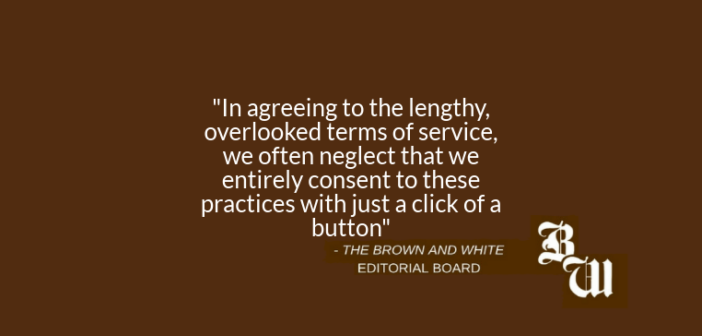I agree to the terms and conditions.
We make this haphazard commitment on a daily basis, not acknowledging the danger it may put us in.
Nowadays, we blindly trust our technology and depend on it for almost every task, but continue to feel violated when that trust is broken.
These privacy invasions may be as small as seeing a recently searched product later advertised on social media, or as drastic as personal data being leaked from a thought-to-be secure server such as the Facebook leak last April.
Despite being justifiably uneasy about the breaches of privacy that we experience daily, in agreeing to the lengthy, overlooked terms of service, we often neglect that we entirely consent to these practices with just a click of a button. And by using internet services free of charge, we consent to our information being shared and sold.
The 2017 repeal of Federal Communications Commission internet privacy protections makes most of these practices entirely legal, as well as profitable.
The legislation allows for internet providers such as Verizon, Comcast, AT&T and more to “sell their users’ information directly to marketers, financial firms and other companies that mine personal data — all of whom could use the data without consumers’ consent.”
In doing so, users benefit from targeted advertising that leads to a more convenient consumer experience. Simultaneously, this access does not just provide markets with product search history, but makes all internet activity available for purchase by larger firms.
There are some circumstances where the blurred lines between typical data selling practices and blatant privacy invasion are crossed.
It was recently found that Facebook left thousands of account passwords in plain sight to its employees. While to many, access to a personal Facebook account isn’t the most valuable asset to keep private, the leak represents a larger issue of security within highly ranked tech companies.
Employees of Facebook and other large media companies are in a position of heightened expectations of trust. Because of their intelligence and access, we anticipate that they will keep our information private and safe, but recent news has proven that not to be the case.
Users are rightfully fearful of larger technology companies. There is so much unknown about the inner workings of the companies that have a hand in almost everything we do on a daily basis.
The issue continues to thrive as children today don’t know any better than to trust the technology they have been raised with. We exist as one of the last wary generations, but we are not any less susceptible to the breaches and invasions committed.
These practices are not limited to social media and marketing. At Lehigh the internet is essential for students to meet their day to day responsibilities. In order to contact professors, connect with other students and hand in assignments, we require access to the internet and specifically to our Lehigh accounts. While Lehigh provides students with Google accounts and a secure Lehigh WiFi, all of these are under the administration’s control.
Lehigh has generally tended to be hands-off in terms of data regulation, but the knowledge that the university possesses access to our searches and documents is enough to leave students uneasy, yet we have no other option.
We have grown to require the immediate satisfaction that we get from technology, but we are undoubtedly living out the end of an era of naivete. Users are beginning to question more and more the security of online activity and acknowledge the discomfort felt when our seemingly private data is out of our control.
While it is easy to call these practices unlawful, we have no other way of existing. We have gown too dependent on the luxuries of technology that we are willing to forego personal privacy and security in order to continue living in blissful ignorance.
The future of technology is extremely uncertain. It is impossible to imagine a life without the technology we have grown so dependent on, yet our current system is not sustainable. As the internet becomes increasingly prevalent, there will be a growing need for terms and conditions that we can all confidently agree upon.






Comment policy
Comments posted to The Brown and White website are reviewed by a moderator before being approved. Incendiary speech or harassing language, including comments targeted at individuals, may be deemed unacceptable and not published. Spam and other soliciting will also be declined.
The Brown and White also reserves the right to not publish entirely anonymous comments.